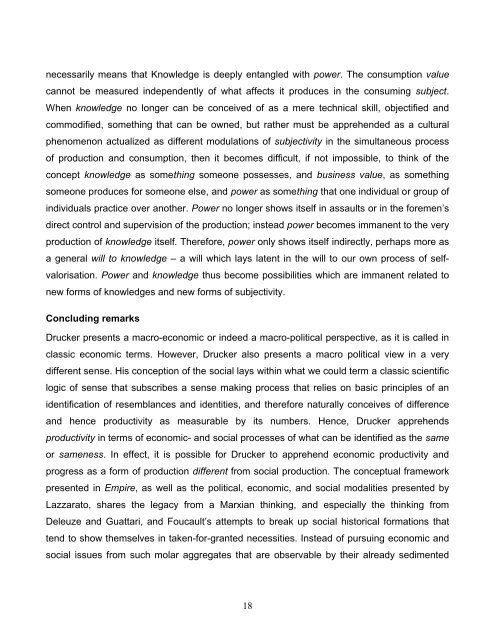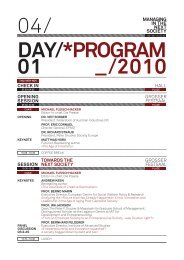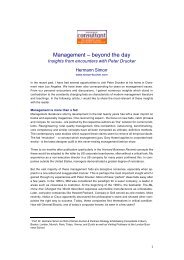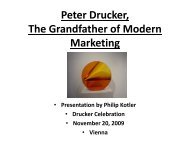From Industrial Capitalism to Taylorian Late Capitalism
From Industrial Capitalism to Taylorian Late Capitalism
From Industrial Capitalism to Taylorian Late Capitalism
Create successful ePaper yourself
Turn your PDF publications into a flip-book with our unique Google optimized e-Paper software.
necessarily means that Knowledge is deeply entangled with power. The consumption value<br />
cannot be measured independently of what affects it produces in the consuming subject.<br />
When knowledge no longer can be conceived of as a mere technical skill, objectified and<br />
commodified, something that can be owned, but rather must be apprehended as a cultural<br />
phenomenon actualized as different modulations of subjectivity in the simultaneous process<br />
of production and consumption, then it becomes difficult, if not impossible, <strong>to</strong> think of the<br />
concept knowledge as something someone possesses, and business value, as something<br />
someone produces for someone else, and power as something that one individual or group of<br />
individuals practice over another. Power no longer shows itself in assaults or in the foremen’s<br />
direct control and supervision of the production; instead power becomes immanent <strong>to</strong> the very<br />
production of knowledge itself. Therefore, power only shows itself indirectly, perhaps more as<br />
a general will <strong>to</strong> knowledge – a will which lays latent in the will <strong>to</strong> our own process of self-<br />
valorisation. Power and knowledge thus become possibilities which are immanent related <strong>to</strong><br />
new forms of knowledges and new forms of subjectivity.<br />
Concluding remarks<br />
Drucker presents a macro-economic or indeed a macro-political perspective, as it is called in<br />
classic economic terms. However, Drucker also presents a macro political view in a very<br />
different sense. His conception of the social lays within what we could term a classic scientific<br />
logic of sense that subscribes a sense making process that relies on basic principles of an<br />
identification of resemblances and identities, and therefore naturally conceives of difference<br />
and hence productivity as measurable by its numbers. Hence, Drucker apprehends<br />
productivity in terms of economic- and social processes of what can be identified as the same<br />
or sameness. In effect, it is possible for Drucker <strong>to</strong> apprehend economic productivity and<br />
progress as a form of production different from social production. The conceptual framework<br />
presented in Empire, as well as the political, economic, and social modalities presented by<br />
Lazzara<strong>to</strong>, shares the legacy from a Marxian thinking, and especially the thinking from<br />
Deleuze and Guattari, and Foucault’s attempts <strong>to</strong> break up social his<strong>to</strong>rical formations that<br />
tend <strong>to</strong> show themselves in taken-for-granted necessities. Instead of pursuing economic and<br />
social issues from such molar aggregates that are observable by their already sedimented<br />
18








